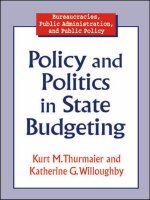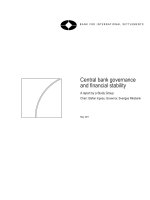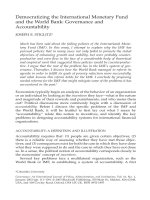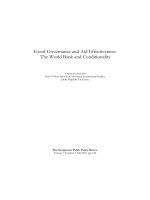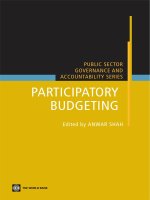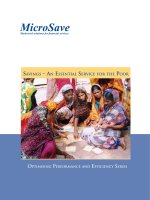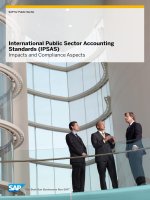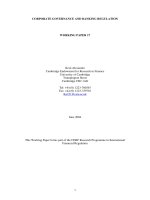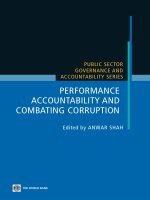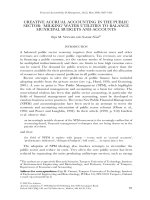PUBLIC SECTOR GOVERNANCE AND ACCOUNTABILITY SERIES - PARTICIPATORY BUDGETING ppt
Bạn đang xem bản rút gọn của tài liệu. Xem và tải ngay bản đầy đủ của tài liệu tại đây (1.26 MB, 300 trang )
PARTICIPATORY
BUDGETING
Edited by ANWAR SHAH
PUBLIC SECTOR
GOVERNANCE AND
ACCOUNTABILITY SERIES
PARTICIPATORY
BUDGETING
Introduction to the Public Sector Governance and Accountability Series
Anwar Shah, Series Editor
A well-functioning public sector that delivers quality public services consistent with citizen pref-
erences and that fosters private market-led growth while managing fiscal resources prudently is
considered critical to the World Bank’s mission of poverty alleviation and the achievement of
the Millennium Development Goals. This important new series aims to advance those objec-
tives by disseminating conceptual guidance and lessons from practices and by facilitating
learning from each others’ experiences on ideas and practices that promote responsive (by
matching public services with citizens’ preferences), responsible (through efficiency and equity
in service provision without undue fiscal and social risk), and accountable (to citizens for all
actions) public governance in developing countries.
This series represents a response to several independent evaluations in recent years that
have argued that development practitioners and policy makers dealing with public sector
reforms in developing countries and, indeed,anyone with a concern for effective public gov-
ernance could benefit from a synthesis of newer perspectives on public sector reforms. This
series distills current wisdom and presents tools of analysis for improving the efficiency,
equity, and efficacy of the public sector. Leading public policy experts and practitioners have
contributed to this series.
The first 14 volumes in this series, listed below, are concerned with public sector
accountability for prudent fiscal management; efficiency,equity, and integrity in public service
provision; safeguards for the protection of the poor, women, minorities, and other dis-
advantaged groups; ways of strengthening institutional arrangements for voice, choice, and
exit; means of ensuring public financial accountability for integrity and results; methods of
evaluating public sector programs, fiscal federalism, and local finances; international practices
in local governance; and a framework for responsive and accountable governance.
Fiscal Management
Public Services Delivery
Public Expenditure Analysis
Local Governance in Industrial Countries
Local Governance in Developing
Countries
Intergovernmental Fiscal Transfers:
Principles and Practice
Participatory Budgeting
Budgeting and Budgetary Institutions
Local Budgeting
Local Public Financial Management
Performance Accountability and
Combating Corruption
Tools for Public Sector Evaluations
Macrofederalism and Local Finances
Citizen-Centered Governance
PUBLIC SECTOR
GOVERNANCE AND
ACCOUNTABILITY SERIES
PARTICIPATORY
BUDGETING
Edited by ANWAR SHAH
THE WORLD BANK
Washington, D.C.
©2007 The International Bank for Reconstruction and Development / The World Bank
1818 H Street, NW
Washington, DC 20433
Telephone: 202-473-1000
Internet: www.worldbank.org
E-mail:
All rights reserved
1 2 3 4 10 09 08 07
This volume is a product of the staff of the International Bank for Reconstruction and
Development / The World Bank. The findings, interpretations, and conclusions expressed
in this volume do not necessarily reflect the views of the Executive Directors of The World
Bank or the governments they represent.
The World Bank does not guarantee the accuracy of the data included in this work.
The boundaries, colors, denominations,and other information shown on any map in this
work do not imply any judgement on the part of The World Bank concerning the legal
status of any territory or the endorsement or acceptance of such boundaries.
Rights and Permissions
The material in this publication is copyrighted. Copying and/or transmitting portions or all
of this work without permission may be a violation of applicable law. The International
Bank for Reconstruction and Development / The World Bank encourages dissemination
of its work and will normally grant permission to reproduce portions of the work promptly.
For permission to photocopy or reprint any part of this work, please send a request
with complete information to the Copyright Clearance Center Inc., 222 Rosewood Drive,
Danvers, MA 01923, USA; telephone: 978-750-8400; fax: 978-750-4470; Internet:
www.copyright.com.
All other queries on rights and licenses, including subsidiary rights, should be
addressed to the Office of the Publisher, The World Bank, 1818 H Street, NW, Washing-
ton, DC 20433, USA; fax: 202-522-2422; e-mail:
ISBN-10: 0-8213-6923-7
ISBN-13: 978-0-8213-6923-4
eISBN-10: 0-8213-6924-5
eISBN-13: 978-0-8213-6924-1
DOI: 10.1596/978-0-8213-6923-4
Library of Congress Cataloging-in-Publication Data
Participatory budgeting / edited by Anwar Shah.
p. cm.
Includes bibliographical references and index.
ISBN-13: 978-0-8213-6923-4
ISBN-10: 0-8213-6923-7
ISBN-10: 0-8213-6924-5 (electronic)
1. Local budgets–Citizen participation–Case studies. 2. Local finance–Case studies.
I. Shah, Anwar.
HJ9111.P37 2007
352.4'8214–dc22
2006032525
v
Contents
Foreword xiii
Preface xv
Acknowledgments xvii
Contributors xix
Abbreviations and Acronyms xxiii
Overview 1
Anwar Shah
Part I Introduction to Participatory
Budgeting
A Guide to Participatory Budgeting 21
Brian Wampler
History of Participatory Budgeting 23
How and Where Does Participatory Budgeting Work? 24
State of the Debate 32
Types of Participatory Budgeting Programs 36
1
CHAPTER
Actors and Motivations for Embracing
Participatory Budgeting 39
Administrative Reform 44
Limitations of Participatory Budgeting 45
How and Where Can Participatory Budgeting
Be Implemented? 47
Policy Implications 49
References 53
Citizen Participation in Budgeting: Prospects for
Developing Countries
55
Donald P. Moynihan
Why Is Participation Important? 55
Fostering Broad and Meaningful Participation in
Developing Countries 62
The Government’s Perspective on Public Participation 78
Conclusions 83
Notes 83
References 83
Part II Regional Surveys
Lessons from Latin America’s Experience with
Participatory Budgeting
91
Benjamin Goldfrank
History of Participatory Budgeting 92
Normative and Analytical Approaches to Participatory
Budgeting 94
National Case Studies 101
Conclusions 116
Notes 119
References 121
Participatory Budgeting in Central and
Eastern Europe
127
Alta Fölscher
The Central and Eastern European Context 128
Case Studies of Participatory Budgeting 134
vi Contents
3
4
2
Conclusions and Lessons Learned 143
Annex: Achievements, Challenges, and Lessons from
Participatory Budgeting Processes in Case Study
Countries 148
Note 155
References 155
Participatory Budgeting in Asia 157
Alta Fölscher
How Can Citizen Participation Enhance
Development? 158
The Asian Context 159
Types of Participatory Budgeting Initiatives 164
Lessons from the Asian Experience 179
Conclusions 187
Notes 188
References 188
Sub-Saharan Africa’s Experience with
Participatory Budgeting
191
Adrienne Shall
Legal Framework, Mechanisms for Participation, and
Impact of Participatory Budgeting 192
Challenges and Lessons Learned 216
Conclusions 221
Notes 222
References 222
Participatory Budgeting in the Middle East and
North Africa
225
Alta Fölscher
Potential for Participatory Budgeting 225
Democracy and Islamic Rules and Values 237
Notes 240
References 240
Contents vii
5
6
7
Appendix: A Primer on Effective Participation 243
Alta Fölscher
Citizen Participation and State Effectiveness 243
Types of Participation 246
Preconditions and Enabling Factors for Citizen Engagement with
Public Decisions 247
References 255
Index 257
On CD ROM
Part III Country Case Studies on Civic
Participation in Subnational Budgeting
Bangladesh: Civic Participation in Subnational
Budgeting
1
Atiur Rahman, Mahfuz Kabir, and Mohammad A. Razzaque
Civic Participation in Subnational Budgeting 3
Capacity Building to Support Civic Participation 18
Conclusion 22
Annex 1: I-PRSP’s Medium-Term Agenda to Enhance Civic
Participation in Local Governance 23
Annex 2: Internal Sources of Revenue of LGIs 24
References 27
Abbreviations 29
India: Civic Participation in Subnational Budgeting 31
Samuel Paul
The Three Levels of Government in India 32
Case Study 1: DISHA, Participation in State-Level
Budgeting 33
Case Study 2: PROOF, a Citizen’s Forum for Monitoring
City Budgets 38
Lessons Learned 43
Capacity Building for Civic Participation 45
viii Contents
Annex: DISHA Budget Briefs Provided to Legislators,
1997–98 47
References 48
The Philippines: Civic Participation in Local
Governance—Focus on Subnational Budgeting
and Planning
49
Alex B. Brillantes, Jr.
Context of Civil Society Participation in Local Governance 50
Civil Society Participation in Subnational Planning 53
Participatory Budgeting Framework 58
References 65
Russia: Civic Participation in Subnational Budgeting 67
Elena Krylova
National Framework: Local Government and
Budgeting 67
Civil Participation Experiences in Budgeting Process 72
South Africa: Civic Participation in Local Government
Policy Making and Budget Processes
91
Adrienne Shall
Participation Approaches 93
Mangaung Case Study 101
Ekurhuleni Case Study 109
National Framework 114
Conclusion 122
References 125
Thailand: Civic Participation in Subnational
Budgeting
127
Charas Suwanmala
Local Service Responsibilities 128
Local Revenues 128
Local Budgeting 129
Summary of Case Studies 130
Building Knowledge 143
Recommendations 151
Abbreviations and Acronyms 154
Contents ix
Ukraine: Civic Participation in Subnational
Budgeting
155
Elena Krylova
General Framework 155
Citizen Participation in Local Budget Process in Ukraine 163
Capacity Building to Support Civic Participation 170
Annex 1: Government System Levels 176
Annex 2: Local Self-Governance System 177
References 178
BOXES
4.1 The Bulgarian Legal Framework for Citizen Participation
in Local Self-Government 131
7.1 Think Tanks in the Arab World 230
FIGURES
1.1 Annual Participatory Budgeting Cycle 29
2.1 Participatory Budgeting Process in Porto Alegre, Brazil 67
2.2 Citizen Satisfaction with Government Services in Bangalore,
1994–2003 78
2.3 Administrative Costs and Instrumental Benefits
of Participation 81
A.1 State Attitude toward Citizen Voice and
Effective Participation 250
TABLES
1.1 Desired Outcomes and Unintended Consequences of
Participatory Budgeting 27
1.2 Roles of Government and Participants during the First Round of
the Participatory Budgeting Process (March–June) 29
1.3 Roles of Government and Participants during the Second Round
of the Participatory Budgeting Process (July–November) 30
1.4 Roles of Government and Participants during Project
Implementation 31
1.5 Number of Participants in Participatory Budgeting Processes
in Selected Cities in Brazil, 1990–2003 33
1.6 Frequency of Participation in Participatory Budgeting
in Belo Horizonte and Betim, Brazil 34
2.1 Typology of Citizen Participation 62
x Contents
3.1 Characteristics of Case Study Municipalities in Bolivia,
Guatemala, Nicaragua, and Peru 113
3.2 Key Aspects of Institutional Design and Measures of Success of
Participatory Budgeting in Case Study Municipalities 115
4A.1 Achievements of and Lessons from Citizen Participation in
Central and Eastern Europe 148
5.1 Constitutional and Legal Provisions for Decentralization and
Participation in Bangladesh, India, Indonesia, the Philippines,
and Thailand 160
6.1 Budget Cycle for Subnational Governments in Kenya 206
6.2 Budget Process in Mangaung, South Africa 208
6.3 Budget Process for Subnational Governments in Tanzania 209
6.4 Budget Process for Subnational Governments in Uganda 210
6.5 Budget Process in Kabwe, Zambia 211
6.6 Budget Process in Gweru, Zimbabwe 212
Contents xi
Foreword
In Western democracies, systems of checks and balances built into
government structures have formed the core of good governance
and have helped empower citizens for more than two hundred years.
The incentives that motivate public servants and policy makers—
the rewards and sanctions linked to results that help shape public sector
performance—are rooted in a country’s accountability frameworks.
Sound public sector management and government spending help
determine the course of economic development and social equity,
especially for the poor and other disadvantaged groups, such as
women and the elderly.
Many developing countries, however, continue to suffer from
unsatisfactory and often dysfunctional governance systems that
include rent seeking and malfeasance, inappropriate allocation of
resources, inefficient revenue systems, and weak delivery of vital
public services. Such poor governance leads to unwelcome outcomes
for access to public services by the poor and other disadvantaged
members of society, such as women, children, and minorities. In
dealing with these concerns, the development assistance community
in general and the World Bank in particular are continuously striving
to learn lessons from practices around the world to achieve a better
understanding of what works and what does not work in improving
public sector governance, especially with respect to combating cor-
ruption and making services work for poor people.
The Public Sector Governance and Accountability Series
advances our knowledge by providing tools and lessons from practices
in improving the efficiency and equity of public services provision and
strengthening institutions of accountability in governance. The series
highlights frameworks to create incentive environments and pressures for
good governance from within and beyond governments. It outlines institu-
tional mechanisms to empower citizens to demand accountability for results
from their governments. It provides practical guidance on managing for
results and prudent fiscal management. It outlines approaches to dealing
with corruption and malfeasance. It provides conceptual and practical guid-
ance on alternative service delivery frameworks for extending the reach and
access of public services. The series also covers safeguards for the protection
of the poor, women, minorities, and other disadvantaged groups; ways of
strengthening institutional arrangements for voice and exit; methods of
evaluating public sector programs; frameworks for responsive and account-
able governance; and fiscal federalism and local governance.
This series will be of interest to public officials, development practi-
tioners, students of development, and those interested in public governance
in developing countries.
Frannie A. Léautier
Vice President
World Bank Institute
xiv Foreword
xv
Preface
Participatory budgeting has been advanced by budget practitioners
and academics as an important tool for inclusive and accountable
governance and has been implemented in various forms in many
developing countries around the globe. Through participatory
budgeting, citizens have the opportunity to gain firsthand knowl-
edge of government operations, influence government policies, and
hold government to account. However,participatory processes also
run the risk of capture by interest groups. Captured processes may
continue to promote elitism in government decision making.
This book provides an overview of the principles underlying
participatory budgeting. It analyzes the merits and demerits of par-
ticipatory budgeting practices around the world with a view to
guiding policy makers and practitioners on improving such prac-
tices in the interest of inclusive governance. This publication
includes five regional surveys, and seven country case studies can
be found on the accompanying CD ROM.
Participatory Budgeting advances the World Bank Institute
agenda on knowledge sharing and learning from cross-country
experiences in reforming public governance. It is intended to assist
policy makers and practitioners in developing countries in making
more-informed choices.
Roumeen Islam
Manager, Poverty Reduction and Economic Management
World Bank Institute
Acknowledgments
This book brings together learning modules on participatory bud-
geting prepared for the World Bank Institute learning programs
directed by the editor over the past three years. These learning mod-
ules were primarily financed by the government of the Netherlands
under the Bank-Netherlands Partnership Program. The government
of Sweden,through its Public Expenditure Management and Financial
Accountability Partnership Program with the World Bank, directed
by the editor, provided financial support for the publication of
this book.
The volume has benefited from contributions to World Bank
Institute learning events by senior policy makers from Africa, Asia,
Central Asia, and the Middle East. The editor is grateful to the lead-
ing scholars who contributed chapters and to the distinguished
reviewers who provided comments. Sandra Gain, Mike Lombardo,
Chunli Shen, and Theresa Thompson helped during various stages
of the preparation of this book and provided comments and
contributed summaries of individual chapters.Kaitlin Tierney pro-
vided excellent administrative support for this project.
I am grateful to Stephen McGroarty for ensuring a fast-track
process for publication of the manuscript. The quality of this book
was enhanced by excellent editorial inputs provided by Barbara
Karni. Production—including editing, typesetting, proofreading,
indexing, and design—was managed by Janet Sasser. Stuart Tucker
is to be thanked for the excellent print quality of the book.
Contributors
ALEX B.BRILLANTES,JR., is dean and professor of public administration
at the National College of Public Administration and Governance,
the University of the Philippines; secretary-general of the Association
of Schools of Public Administration of the Philippines; and deputy
secretary general of the Eastern Regional Organization for Public
Administration. He is the author of Innovations and Excellence
in Local Governance (2004), The Philippine Presidency (1992), and
Dictatorship and Martial Law (1988), as well as many scholarly
articles on local government, development administration, and
civil society.
ALTA FÖLSCHER is a principal consultant with Mokoro Ltd., Oxford,
United Kingdom. She has worked with development institutions,
civil society organizations, ministries of finance, and legislatures on
governance, budget and financial management,and pro-poor public
policy issues.
BENJAMIN GOLDFRANK is assistant professor of political science at the
University of New Mexico. His teaching and research interests focus
on Latin American politics, subnational governments, processes of
democratization, and social movements. He is the coeditor of The
Left in the City: Participatory Local Governments in Latin America
(2004) and the author of several book chapters and scholarly articles.
MAHFUZ KABIR is a research fellow at the Bangladesh Institute of
International and Strategic Studies in Dhaka. He has published
extensively on participation and participatory budgeting in scholarly
books and journals.
ELENA KRYLOVA is the managing director of Development Partnership Inter-
national, a Switzerland-based development consultancy company specializing
in governance issues in Eastern Europe and the former Soviet Union. She is
an expert on citizen participation in governance, democratic decentraliza-
tion, public sector transparency and accountability, and participatory devel-
opment management.
She has served as a consultant to international development agencies,
including the European Commission, One World Action (a nongovern-
mental organization), the Organisation for Security and Cooperation in
Europe, the Swiss Agency for Development and Cooperation, the Swiss Red
Cross, the United Nations Development Programme, and the World Bank.
DONALD P. MOYNIHAN is assistant professor at La Follette School of Public
Affairs at the University of Wisconsin—Madison. His research and teaching
interests include performance management,homeland security, citizen par-
ticipation, public budgeting, and the selection and implementation of public
management reforms. He is the author of numerous scholarly articles and a
forthcoming book, Rethinking Performance Management.
SAMUEL PAUL is founder and chairman of the board of the Public Affairs Centre
in Bangalore, India. He spearheaded the development of citizen report cards
as a public accountability tool.A former director and professor of economics
at the Indian Institute of Management in Ahmedabad, he has served as an
adviser to the Indian government, the United Nations, and the World Bank.
His latest book,which he coauthored, is Who Benefits from India’s Public Ser-
vices? A People’s Audit of Five Basic Services (2006).
ATIUR RAHMAN is professor of development studies at the University of Dhaka;
honorary chairman of Unnayan Shamannay, a Bangladeshi think tank; and
chairman of Credit Development Forum, the largest networking organization
of multinational financial institutions in Bangladesh. He is the author or coau-
thor of many scholarly articles and books, including Budget and the Poor
(2002), People’s Budget: An Illustrative Exercise Using Participatory Tools (2002),
and Peasants and Classes: A Study in Differentiation in Bangladesh (1986).
MOHAMMAD A. RAZZAQUE is an assistant professor in the Department of
Economics at the University of Dhaka, and is currently serving in London as
an economic adviser in the Economic Affairs Division of the Commonwealth
Secretariat of the United Kingdom. He has been involved in research projects
sponsored by various multilateral organizations and national governments,
xx Contributors
including the Asian Development Bank, the European Commission, the
International Development Research Centre, the International Labour
Organization, the United Nations Development Programme, the United
Nations Conference on Trade and Development,the World Institute for Devel-
opment Economics Research, and the governments of Bangladesh and Japan.
ANWAR SHAH is the lead economist and program leader in public sector
governance at the World Bank Institute. He is also a fellow of the Institute
for Public Economics in Edmonton, Alberta, Canada, and a board member
of the International Institute of Public Finance in Munich, Germany.
ADRIENNE SHALL is an economist specializing in public sector budgeting and
financial management. Her consulting company has worked extensively
with national, provincial, and local governments as well as with the national
parliament, provincial legislatures, and civil society groups in South Africa.
She has served as a consultant to the World Bank Institute and worked on
intervention projects in Lesotho, Malawi, Nigeria, Swaziland, and Zambia.
CHARAS SUWANMALA is professor of political science at Chulalongkorn
University in Bangkok. He has been deeply involved in decentralization
processes in Thailand for more than two decades. He has served as a
consultant to the United Nations Development Programme, the World
Bank, and other international agencies. He recently created a knowledge and
learning network on local government initiatives in Thailand.
BRIAN WAMPLER is assistant professor of political science at Boise State
University in Idaho. He has published scholarly articles on participatory pol-
itics, some of which have been translated into Chinese, Portuguese, and
Spanish. He is writing a book entitled Delegation, Cooperation, and Contes-
tation: Participatory Democracy in Eight Brazilian Cities.
Contributors xxi
Abbreviations and Acronyms
CBO community-based organization
CCAGG Concerned Citizens of Abra for Good
Governance (the Philippines)
CSO civil society organization
DISHA Development Initiatives for Social and Human
Action (India)
ESCWA United Nations Economic and Social
Commission for Western Asia
FSLN Sandinista National Liberation Front (Nicaragua)
(Frente Sandinista de Liberación Nacional)
HIPC Heavily Indebted Poor Countries (Initiative)
IDASA Institute for Democracy in South Africa
KDP Kecamatan Development Program (Indonesia)
LASDAP Local Authority Service Delivery Action Plan (Kenya)
MKSS Mazdoor Kisan Shakti Sangathan (India)
NGO nongovernmental organization
PAC Public Affairs Centre (India)
PROOF Public Record of Operations and Finance (India)
PRSP Poverty Reduction Strategy Paper
TAO Tambon (subdistrict) Administrative Organization
(Thailand)
UNDP United Nations Development Programme
UNICEF United Nations Children’s Fund
USAID United States Agency for International
Development
